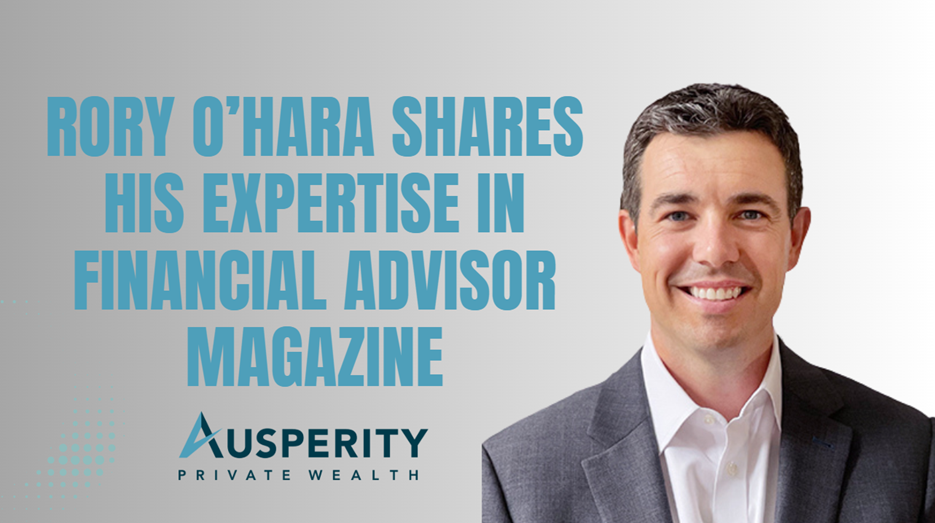We’re proud to share that Rory O’Hara, founder and senior managing partner of Ausperity Private Wealth in Moorestown, NJ, was recently featured in Financial Advisor Magazine’s article “How to Win Clients in a Down Market.”
In the article, Rory offers valuable insight into how market uncertainty presents a unique opportunity for advisors to build trust and long-term relationships. Instead of offering louder opinions during volatile times, he emphasizes the importance of providing clarity, leadership, and a well-defined process.
Let’s take a closer look at Rory’s key takeaways from the article.
Uncertain Markets Are Ideal for Earning Client Trust
While challenging, uncertain markets are a perfect opportunity for financial advisors to build deep client trust.
During these volatile times, clients are most vulnerable and seek clarity, empathy, clear communication, and steadfast guidance, allowing advisors to demonstrate their value beyond just returns.
Rory punctuates this concept in the article by sharing, “Clients don’t need louder opinions—they need clarity, leadership and a trusted process. Communication becomes the most powerful tool.”
Clients Need Clear Communication, Not Noise
Clear, intentional communication is a powerful tool.
Especially during periods of market uncertainty or significant life changes, clients don’t need a constant barrage of general market news or irrelevant data.
What they truly need is simplified explanations of how current events or investment strategies directly impact their specific financial plan.
Flooding them with “noise” like generic newsletters, complex jargon, or unsolicited market commentary without personalized context only creates anxiety, confusion, and erodes trust.
Savvy advisors like Rory O’Hara understand the significance of customized guidance.
Listening, Educating, and Guiding Are More Important Than Ever
The core tenets of wealth management (listening, educating, and guiding) are paramount.
Clients are seeking empathetic ears for their unique concerns, clear explanations of complex market forces, and confident direction through uncertainty, far beyond mere transactional advice.
“Not only do people seek direction,” Rory explains, “many prospective clients may be particularly open to strong, differentiated guidance.”
Essentially, it’s critical to maintain a relentless client focus by paying close attention to what clients are most concerned about and taking the time to educate them on topics like the normal fluctuations of market cycles.
A Steady, Empathetic Approach Reinforces Long-Term Value
When market turbulence hits, or personal circumstances shift, clients often face heightened anxiety and the temptation to make impulsive decisions driven by fear.
Rory tells us, “Market turbulence isn’t a setback for advisors; it’s a stage to prove your worth and build relationships that competitors can’t replicate.”
By offering reassurance, demonstrating unwavering commitment to their long-term plan, and acknowledging emotional realities with empathy, advisors like Rory move beyond being just investment managers to becoming trusted confidantes, solidifying a relationship built on resilience and proving the enduring worth of strategic, personalized guidance over fleeting market fluctuations.
Let’s Talk About What Matters to You
At Ausperity Private Wealth, we believe clients deserve a steady hand and a trusted partner through all of life’s changes. That’s why Rory O’Hara and our team stay focused on listening closely, educating clearly, and offering guidance that’s both strategic and personal.
If you’re looking for a long-term partner who brings clarity and care to every conversation, we’d love to connect.
To schedule a meeting, call (856) 252-0102, email [email protected], or book online here.
About Rory
Rory O’Hara, CFP®, CRPC™, is Founder and Senior Managing Partner at Ausperity Private Wealth, an independent wealth management firm based in Moorestown, New Jersey, dedicated to helping clients preserve and grow wealth and transition their financial legacy for generations to come. Rory founded Ausperity Private Wealth in 2021 after feeling constrained at Merrill Lynch and seeking more limitless opportunities to help people manage their finances. With over 15 years of experience as a wealth advisor, Rory focuses on guiding Baby Boomers through the next phase of their lives and helping high-income Millennials pursue their long-term financial goals with confidence.
Prior to establishing Ausperity, Rory led his own team, The O’Hara Group, at Merrill Lynch Wealth Management. He was a member of the exclusive Merrill Lynch Advisor Growth Network, where he taught advanced financial planning strategies to other advisors. His commitment to excellence in financial planning has earned him multiple accolades, including being recognized by Forbes as a Best in State Wealth Advisor in 2021 and 2023* and ranking on the Forbes Top Next-Gen Wealth Advisors Best-in-State list* multiple times. In 2022, Rory ranked #5 on AdvisorHub’s 25 Next Gen Advisors to Watch list**, and in 2023, he was nominated to AdvisorHub’s 100 Advisors to Watch Under $1B**. Most recently, he ranked #89 in AdvisorHub’s 1000 Advisors to Watch list, 250 Under $1Bil for 2024.
Rory holds a degree from Villanova University and is a CERTIFIED FINANCIAL PLANNER® professional, as well as a Chartered Retirement Planning Counselor™. Outside of the office, Rory enjoys spending time with his wife and four children, playing golf, and cheering on Villanova basketball. He is also a proud board member of The Cathedral Kitchen in Camden, New Jersey, where he serves as the Chair of the Fundraising Committee. To learn more about Rory, connect with him on LinkedIn.
*Forbes Best-In-State Wealth Advisors (2021, 2023) & Top Net-Gen Wealth Advisors (2018, 2019, 2020, 2022), created by SHOOK Research. No fees were paid to be considered or to hold out marketing materials. Not indicative of advisor’s future performance. Your experience may vary.
**AdvisorHub’s 25 Next Gen-Advisors to Watch (2022) & 100 Advisors to Watch Under $1B (2023), created by AdvisorHub. No fees were paid to be considered or to hold out marketing materials. Not indicative of advisor’s future performance. Your experience may vary.
**AdvisorHub’s 1000 Advisors to Watch Under $1B (2024), created by AdvisorHub, created by AdvisorHub. No fees were paid to be considered or to hold out marketing materials. Not indicative of advisor’s future performance. Your experience may vary.

